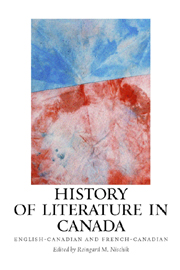Book contents
- Frontmatter
- Contents
- Acknowledgments
- Introduction: Writing a History of Literature in Canada
- I Beginnings
- II The Literature of New France, 1604–1760
- III The Literature of British Canada, 1763–1867
- IV From the Dominion to the Territorial Completion of the Nation, 1867–1918
- V The Modern Period, 1918–1967
- 11 Politics and Literature between Nationalism and Internationalism
- 12 English-Canadian Poetry, 1920–1960
- 13 The English-Canadian Novel and the Displacement of the Romance
- 14 The Modernist English-Canadian Short Story
- 15 Early English-Canadian Theater and Drama, 1918–1967
- 16 French Canada from the First World War to 1967: Historical Overview
- 17 French-Canadian Poetry up to the 1960s
- 18 The French-Canadian Novel between Tradition and Modernism
- 19 The French-Canadian Short Story
- 20 French-Canadian Drama from the 1930s to the Révolution tranquille
- VI Literature from 1967 to the Present
- Further Reading
- Notes on the Contributors
- Index
20 - French-Canadian Drama from the 1930s to the Révolution tranquille
from V - The Modern Period, 1918–1967
Published online by Cambridge University Press: 12 September 2012
- Frontmatter
- Contents
- Acknowledgments
- Introduction: Writing a History of Literature in Canada
- I Beginnings
- II The Literature of New France, 1604–1760
- III The Literature of British Canada, 1763–1867
- IV From the Dominion to the Territorial Completion of the Nation, 1867–1918
- V The Modern Period, 1918–1967
- 11 Politics and Literature between Nationalism and Internationalism
- 12 English-Canadian Poetry, 1920–1960
- 13 The English-Canadian Novel and the Displacement of the Romance
- 14 The Modernist English-Canadian Short Story
- 15 Early English-Canadian Theater and Drama, 1918–1967
- 16 French Canada from the First World War to 1967: Historical Overview
- 17 French-Canadian Poetry up to the 1960s
- 18 The French-Canadian Novel between Tradition and Modernism
- 19 The French-Canadian Short Story
- 20 French-Canadian Drama from the 1930s to the Révolution tranquille
- VI Literature from 1967 to the Present
- Further Reading
- Notes on the Contributors
- Index
Summary
Institutional Framework
THE LATE DEVELOPMENT OF FRENCH-CANADIAN THEATER is above all a result of its institutional framework: For a long time, secular drama was decried as amoral and was therefore prohibited. The clergy, in particular, who made a decisive contribution to the history of drama by encouraging the performance of plays in the collèges for the purpose of classical education, rhetorical training, and the moral edification of pupils, rejected the performance of “profane” texts. Beginning with the 1930s, however, the influence of European theater led to a modernization in the repertoire and the performance practice of clerical theater. Many clergymen also composed their own plays, for example, Antonin Lamarche (1899–1967) and his brother Gustave (1895–1987), who achieved great success with Jonathas (1931) and the open-air theater piece La défaite de l'enfer (1938), and who also wrote numerous mystery plays, clerical plays, and dramatic fragments. Émile Legault (1906–1983) — who has since been acknowledged as the founder of modern French-Canadian drama — wrote clerical plays, too, and welcomed avant-gardist tendencies, for instance, in matters of stage decor. He broke away from the limitation to a religious repertoire and performed not only Christian but also secular classical and modern plays, for example, by Molière, Jean Anouilh, T. S. Eliot, Carlo Goldoni, Luigi Pirandello, and Jean Cocteau, as well as by Jacques Copeau, whose aesthetics had a strong influence on him. In 1937 Legault founded the amateur group Les Compagnons de Saint-Laurent at the Collège Saint-Laurent in Montreal, which later became a professional institution and produced the theater magazine Les Cahiers des Compagnons.
- Type
- Chapter
- Information
- History of Literature in CanadaEnglish-Canadian and French-Canadian, pp. 270 - 282Publisher: Boydell & BrewerPrint publication year: 2008



